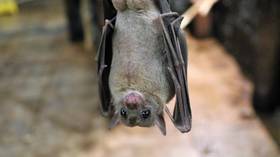Indian scientists discover new type of coronavirus in two species of fruit BAT

While the world battles against the rapidly spreading Covid-19 disease, another type of coronavirus has been discovered in bats inhabiting India, a new study has found.
Some 25 bats have tested positive for the new coronavirus dubbed BtCoV, local media reported, citing a study by the Indian Council of Medical Research (ICMR). The tested animals are from the bat species Rousettus and Pteropus, commonly referred to as fruit bats. They were found in India's southern states of Kerala, Tamil Nadu and Puducherry, as well as in Himachal Pradesh state in the Western Himalayas.
Also on rt.com Pentagon looked ‘hard’ into theory Covid-19 came from Chinese lab, but ‘inconclusive’ evidence still suggests natural origin"These bat coronaviruses have no relation with SARS-CoV2 responsible for the Covid-19 pandemic," said Pragya Yadav, a researcher at the National Institute of Virology (NIV) in Pune and one of the study's authors. She further explained that there is no evidence yet that the newly-discovered bat coronavirus could cause disease in humans.
The Pteropus bat species, however, had previously tested positive for the Nipah virus, which killed 17 people during the 2018 outbreak in Kerala. Covid-19 has also been linked to bats due to its similarity to the viruses found inside them.
"Bats are considered to be the natural reservoir for many viruses, of which some are potential human pathogens," Yavad said, adding that "continuous active surveillance" is needed to detect the emerging novel viruses that could potentially cause epidemics.
Also on rt.com These US intel reports ACCURATELY PREDICTED pandemic years ago. Why was NOTHING done?Think your friends would be interested? Share this story!













